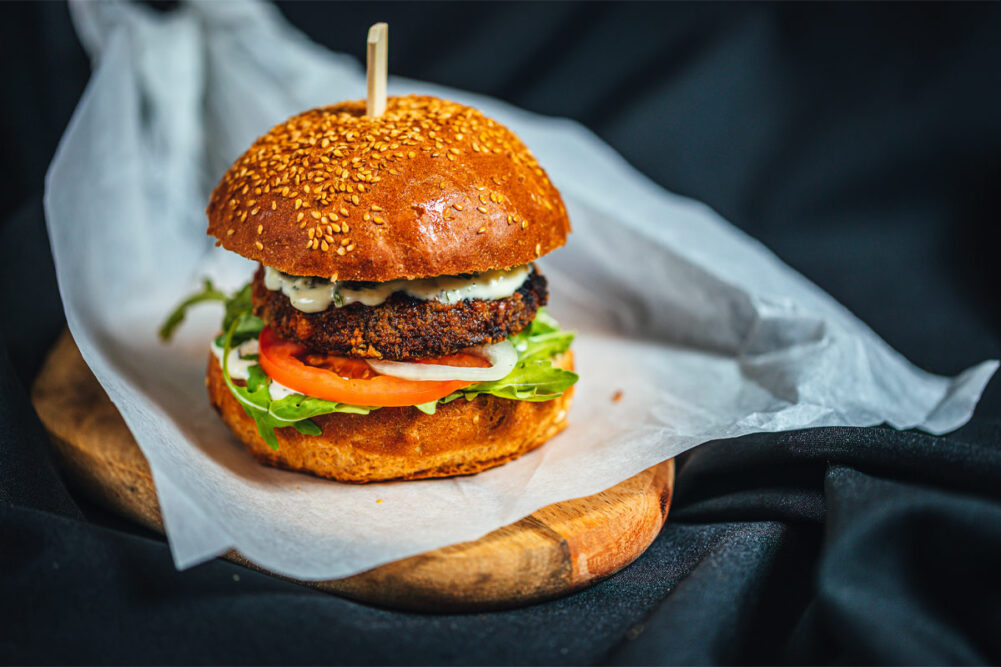 KANSAS CITY — Growing mushrooms above ground and sprouting soybeans are two entrepreneurial efforts looking to make plant-based protein ingredients more nutritious, affordable and sustainable.
KANSAS CITY — Growing mushrooms above ground and sprouting soybeans are two entrepreneurial efforts looking to make plant-based protein ingredients more nutritious, affordable and sustainable.
Mush Foods, Ltd., Rehovot, Israel, a portfolio company of the Strauss Group Kitchen FoodTech Hub founded in 2021, now offers a 50CUT mycelium protein ingredient system to reduce the animal protein content in meat products by 50%, said Shalom Daniel, co-founder and chief executive officer of Mush Foods. The ingredient requires no agricultural land and uses minimal energy and water, according to the company. Cultivation does not depend on season or climate.
A binder and whole protein, the mushroom mycelium needs no added binders and offers an umami flavor and a fleshy meat-like texture as well as fiber, vitamins and minerals, Mr. Daniel said.
The company so far has developed 50CUT beef and 50CUT chicken. Pilot plants will be built in the United States. Company plans are to launch sales in the first quarter of 2024.
Growing mushrooms above ground
The MIGAL Galilee Research Institute in Israel initially developed Mush Foods’ technology for upcycling food streams. Idan Pereman, PhD, co-founded Mush Foods and serves as mycology director for the company. Dan Levanon, PhD, another co-founder, is chief scientific officer.
Mushrooms, the reproductive fruit of fungi, are a small part of the organism’s biomass, Mr. Daniel said. In nature, over 90% of the fungi’s total biomass is contained in the underground mycelium, making it inaccessible. Mush Foods’ above-ground cultivation method overcomes that barrier to yield a nutritious and sustainable food source, he said.
“We grow the mycelium above the ground in indoor farms using a highly efficient method,” Mr. Daniel said. “Our fermentation platform recreates the underground growth conditions, without light and uses minimal land, energy and water.”
Another common method to grow mushroom mycelium involves liquid fermentation in bioreactors.
“Alternatively, other companies use dry fermentation and therefore must contend with the substrate as part of the final product as the mycelium grows interwoven into the growth medium,” Mr. Daniel said. “In contrast, Mush Foods employs a unique, patent-protected, solid-state fermentation process that ‘coaxes’ fungi to grow and spread on top of the substrate as a layer of 100% pure mycelium. To produce higher yields and an improved nutrient profile (including protein, beta-glucans and vitamins), we developed unique mixtures of upcycled waste from agriculture and food industry to produce substrates individually tailored for optimal growth of our various mushroom strains, each particularly suited to a specific type of animal protein.
Mush Foods combines several types of food waste, tailoring ingredients to create a growth medium suited for each different mycelium strain. The main ingredients are sidestreams from coffee, beer, soy and corn production.
Mush Foods grows 14 types of edible mycelium, Mr. Daniel said. The 50CUT products are a mix of different kinds of mycelium to complement the particular texture, aroma, mouthfeel and taste of each animal protein.
More umami and nutrition
Koji Ochiai, chief technology officer of the Daiz company based in Kumamoto City, Japan, created the Ochiai germination method, which activates the metabolism of soybeans and makes it possible to produce sprouted soybeans with improved umami flavor, nutritional value and functionality.
Patents related to the OGM have been granted in Japan, the United States and the European Union. A patent is pending in China.
Daizu means soybeans in Japan. Daiz uses OGM to create Miracle Meat, a soy-based meat alternative ingredient that may be used in plant-based alternatives for burgers, chicken, nuggets, dumplings and spring rolls.
The Daiz USA, Inc. office is in Boston. The company is preparing to supply Miracle Meat to US food companies.
Mr. Ochiai has worked on germination technology for more than 30 years. After graduating from the Kinki University Faculty of Agriculture in Japan with a degree in molecular biochemistry, he worked in the food industry and launched a bean sprout factory to develop the market in California.
He later founded a biotech venture in California’s Napa Valley in 2002 before joining Diaz in 2015. When he had a biotech venture, Mr. Ochiai attempted a cultivation method that allowed soybeans to germinate within 13 hours. He exposed the germinated soybeans to certain environmental stresses by controlling the temperature, amount of oxygen, carbon dioxides and moisture, which activated the metabolism of soybeans and increase their amino acid levels.
The soybeans have 10 times as much glutamic acid (the source of umami flavor) and twice as much arginine (the source of energy).
Tsuyoshi Ide, who was managing the Kajitsudo company in Kumamo City, visited Mr. Ochiai’s bio-venture company and was impressed by the fermentation method. He appointed Mr. Ochiai as director of Kajitsudo’s germination laboratory, which had been established to develop the plant-based meat alternatives business.
Research began in 2015. Daiz was founded Dec. 1, 2015, and began selling the company’s non-GMO sprouted soybeans to retailers for use in salads. The plant-based food business has operated since 2020.
When visiting the United States, Mr. Ochiai and Mr. Ide noticed defatted soybeans on the ingredients lists of various plant-based meat alternatives. The nutritional value of defatted soybeans is not as rich, and seasonings and additives often are used to improve their taste. Mr. Ochiai and Mr. Ide decided Daiz would become a raw material supplier of sprouted soybean ingredients for plant-based meat alternatives.
Daiz now has capital alliances with 18 companies, including Nisshin.
Enjoying this content? Learn about more disruptive startups on the Food Entrepreneur page.





